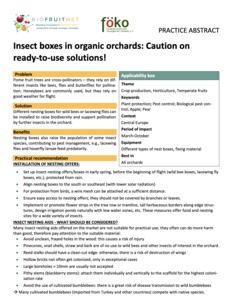{Tool} Insect boxes in organic orchards: Caution on ready-to-use solutions! (BIOFRUITNET Practice Abstract). Creator(s): Adolphi, Christina and Oeser, Niklas. Issuing Organisation(s): FÖKO - Fördergemeinschaft Ökologischer Obstbau. Biofruitnet Practice Abstract, no. 032. (2022)
|
PDF
- Published Version
- English
(Insect boxes in organic orchards: Caution on ready-to-use solutions!)
388kB | |
|
PDF
- Published Version
- German/Deutsch
(Insekten-Nistkästen im ökologischen Obstbau: Vorsicht bei gebrauchsfertigen Lösungen!)
382kB | |
![[thumbnail of Bildschirmfoto 2023-06-29 um 11.55.45.png]](/44993/5.hassmallThumbnailVersion/Bildschirmfoto%202023-06-29%20um%2011.55.45.png)  Preview |
Image (PNG)
- Cover Image
- German/Deutsch
841kB |
Document available online at: https://orgprints.org/44993
Summary in the original language of the document
Nesting boxes also raise the population of some insect species, contributing to pest management, e.g., lacewing flies and hoverfly larvae feed predatorily.
Practical recommendation
INSTALLATION OF NESTING OFFERS:
• Set up insect nesting offers/boxes in early spring, before the beginning of flight (wild bee boxes, lacewing fly boxes, etc.), protected from rain.
• Align nesting boxes to the south or southeast (with lower solar radiation)
• For protection from birds, a wire mesh can be attached at a sufficient distance.
• Ensure easy access to nesting offers; they should not be covered by branches or leaves.
• Implement or promote flower strips in the tree row or tramline, tall herbaceous borders along edge structures, design irrigation ponds naturally with low water zones, etc. These measures offer food and nesting sites for a wide variety of insects.
INSECT NESTING AIDS - WHAT SHOULD BE CONSIDERED?
Many insect nesting aids offered on the market are not suitable for practical use; they often can do more harm than good, therefore pay attention to the suitable material:
• Avoid unclean, frayed holes in the wood: this causes a risk of injury
• Pinecones, snail shells, straw and bark are of no use to wild bees and other insects of interest in the orchard.
• Reed stalks should have a clean-cut edge: otherwise, there is a risk of destruction of wings
• Hollow bricks not often get colonized, only in exceptional cases
• Large boreholes > 10mm are usually not accepted
• Pithy stems (blackberry stems): attach them individually and vertically to the scaffold for the highest colonisation rate
• Avoid the use of cultivated bumblebees: there is a great risk of disease transmission to wild bumblebees
--> Many cultivated bumblebees (imported from Turkey and other countries) compete with native species.
| EPrint Type: | Practice tool |
|---|---|
| What problem does the tool address?: | Pome fruit trees are cross-pollinators – they rely on different insects like bees, flies and butterflies for pollination. Honeybees are commonly used, but they rely on good weather for flight. |
| What solution does the tool offer?: | Different nesting boxes for wild bees or lacewing flies can be installed to raise biodiversity and support pollination by further insects in the orchard. |
| Country: | Germany |
| Type of Practice Tool: | Practice abstracts |
| Keywords: | Plant protection, Pest control, Biological pest control, Apple, Pear |
| Agrovoc keywords: | Language Value URI English plant protection http://aims.fao.org/aos/agrovoc/c_5978 English pest control http://aims.fao.org/aos/agrovoc/c_5726 English biological pest control http://aims.fao.org/aos/agrovoc/c_330635 English apples http://aims.fao.org/aos/agrovoc/c_541 English pears http://aims.fao.org/aos/agrovoc/c_5645 |
| Subjects: | Crop husbandry > Production systems > Fruit and berries |
| Research affiliation: | European Union > Horizon 2020 > Biofruitnet Germany > Fördergemeinschaft Ökologischer Obstbau - FÖKO European Union > Organic Farm Knowledge |
| Horizon Europe or H2020 Grant Agreement Number: | 862850 |
| Related Links: | https://organic-farmknowledge.org/tool/44993, https://biofruitnet.eu, https://twitter.com/farm_knowledge/status/1674359812623089664, https://www.facebook.com/organicfarmknowledge/posts/pfbid0tyNkE36h7NqD4qQepeg32Bb3UerFy7cc2TWbHRLsyd8EKdhARQBvErCu4oVWQmgXl |
| Project ID: | ofk |
| Deposited By: | Basler, Andreas |
| ID Code: | 44993 |
| Deposited On: | 24 Dec 2022 11:03 |
| Last Modified: | 02 May 2024 10:31 |
| Document Language: | English, German/Deutsch |
| Status: | Published |
Repository Staff Only: item control page

 Download Statistics
Download Statistics Download Statistics
Download Statistics
